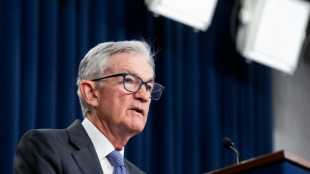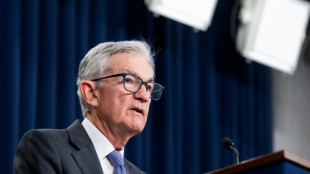
-
 Trump has options on Iran, but first must define goal
Trump has options on Iran, but first must define goal
-
Paris FC's Ikone stuns PSG to knock out former club from French Cup

-
 Australia's ambassador to US leaving post, marked by Trump rift
Australia's ambassador to US leaving post, marked by Trump rift
-
Slot angered by 'weird' Szoboszlai error in Liverpool FA Cup win

-
 Szoboszlai plays hero and villain in Liverpool's FA Cup win
Szoboszlai plays hero and villain in Liverpool's FA Cup win
-
Hawaii's Kilauea volcano puts on spectacular lava display

-
 US stocks at records despite early losses on Fed independence angst
US stocks at records despite early losses on Fed independence angst
-
Koepka rejoins PGA Tour under new rules for LIV players

-
 Ex-France, Liverpool defender Sakho announces retirement
Ex-France, Liverpool defender Sakho announces retirement
-
Jerome Powell: The careful Fed chair standing firm against Trump

-
 France scrum-half Le Garrec likely to miss start of Six Nations
France scrum-half Le Garrec likely to miss start of Six Nations
-
AI helps fuel new era of medical self-testing

-
 Leaders of Japan and South Korea meet as China flexes muscles
Leaders of Japan and South Korea meet as China flexes muscles
-
Trump sets meeting with Venezuelan opposition leader, Caracas under pressure

-
 Australia captain Alyssa Healy to retire from cricket
Australia captain Alyssa Healy to retire from cricket
-
US 'screwed' if Supreme Court rules against tariffs: Trump

-
 NATO, Greenland vow to boost Arctic security after Trump threats
NATO, Greenland vow to boost Arctic security after Trump threats
-
Israel to take part in first Eurovision semi-final on May 12

-
 How Alonso's dream Real Madrid return crumbled so quickly
How Alonso's dream Real Madrid return crumbled so quickly
-
Ex-Fed chiefs, lawmakers slam US probe into Jerome Powell

-
 Former Panama leader on trial over mega Latin America corruption scandal
Former Panama leader on trial over mega Latin America corruption scandal
-
Trump keeping Iran air strikes on the table: White House

-
 Paramount sues in hostile bid to buy Warner Bros Discover
Paramount sues in hostile bid to buy Warner Bros Discover
-
Ugandan opposition leader Bobi Wine warns of protests if polls rigged

-
 Airbus delivers more planes in 2025
Airbus delivers more planes in 2025
-
Alonso leaves Real Madrid, Arbeloa appointed as coach

-
 UK pays 'substantial' compensation to Guantanamo inmate: lawyer
UK pays 'substantial' compensation to Guantanamo inmate: lawyer
-
Iran protest toll mounts as government stages mass rallies

-
 Gold hits record high, dollar slides as US targets Fed
Gold hits record high, dollar slides as US targets Fed
-
Cuba denies being in talks with Trump on potential deal

-
 Scientists reveal what drives homosexual behaviour in primates
Scientists reveal what drives homosexual behaviour in primates
-
Venezuela releases more political prisoners as pressure builds

-
 15,000 NY nurses stage largest-ever strike over conditions
15,000 NY nurses stage largest-ever strike over conditions
-
Rosenior plots long Chelsea stay as Arsenal loom

-
 Zuckerberg names banker, ex-Trump advisor as Meta president
Zuckerberg names banker, ex-Trump advisor as Meta president
-
Reza Pahlavi: Iran's ex-crown prince dreaming of homecoming

-
 Venezuela releases more political prisoners
Venezuela releases more political prisoners
-
Kenya's NY marathon champ Albert Korir gets drug suspension

-
 US prosecutors open probe of Fed chief, escalating Trump-Powell clash
US prosecutors open probe of Fed chief, escalating Trump-Powell clash
-
Russian captain in fiery North Sea crash faces UK trial

-
 Carrick is frontrunner for interim Man Utd job: reports
Carrick is frontrunner for interim Man Utd job: reports
-
Iran government stages mass rallies as alarm grows over protest toll

-
 Variawa leads South African charge over Dakar dunes
Variawa leads South African charge over Dakar dunes
-
Swiss inferno bar owner detained for three months

-
 Heathrow airport sees record high annual passenger numbers
Heathrow airport sees record high annual passenger numbers
-
Georgia jails ex-PM for five years amid ruling party oustings

-
 Kyiv buries medic killed in Russian drone strike
Kyiv buries medic killed in Russian drone strike
-
Israel revokes French researcher's travel permit

-
 India and Germany seek to boost defence industry ties
India and Germany seek to boost defence industry ties
-
French coach and football pundit Rolland Courbis dies at 72


Tech's green wave hits choppy waters
Tech entrepreneurs have spent years selling the dream that we can save the planet without changing our ways, but the current focus of innovation is dividing experts and investors.
The tech industry loves splashy world-saving ideas and spends billions on the hunt for new energy sources, often clashing with calls from activists and experts simply to use less energy.
The Web Summit in Lisbon this week, one of Europe's biggest tech events, gave top billing to a Californian firm called Twelve that claims to be able to make sustainable jet fuel out of the carbon dioxide in the air.
"In a lot of ways we're mimicking trees and plants," Twelve cofounder Etosha Cave told the audience, describing a process that takes carbon dioxide out of the atmosphere and converts it into fuel.
Cave painted a picture of a future where her company's tech could power long-haul flights and even help exploit mineral wealth on Mars -- a utopian vision that has helped her firm raise some $650 million.
The interviewer on stage with Cave told her it "sounds like magic".
Climate expert Mike Berners-Lee, a professor at the University of Lancaster in the UK, told AFP that world-changing claims about sustainable fuel or new energy sources needed to be viewed sceptically.
"Everyone's looking for a silver bullet that would mean we wouldn't have to do anything difficult," he said.
More broadly, the green wave in tech is entering a tricky period.
While Twelve and other major startups are attracting massive investment, Bloomberg recently reported that funding for climate tech was on track to fall 50 percent this year compared with last year.
- Big losses -
And climate tech has long been subject to the whims of politics and global economic trends.
The current green wave is the second this century.
The first -- now called Clean Tech 1.0 -- was fostered by US politician Al Gore, whose calls for funding were met with an estimated $25 billion of investments.
The period ended in 2011 after the global financial crisis ended cheap loans and China ramped up its solar panel output, wiping out most US startups and roughly half of investors' cash.
But those investments were not wasted.
They led to an era of inexpensive solar and wind power and laid the foundations for the electric vehicle revolution.
Clean Tech 2.0 began around 2018 as companies and governments committed to net-zero carbon targets laid out by the 2015 Paris Climate Agreement.
However, the US has re-elected Donald Trump as president with support from many leaders in the tech industry.
Trump -- an avowed climate-change denier whose campaigning slogan on fossil fuels was "dig baby dig" -- withdrew the US from the agreement in his first term and analysts believe he will do the same again.
And the global fight against climate change is still fraught, with national leaders meeting for the UN's COP29 climate summit in Azerbaijan this week divided on the idea of phasing out fossil fuels, the main driver of global warming.
- 'Severe reservations' -
All this leaves climate tech in a precarious moment, and startups without world-saving narratives are scrambling to get funding from a smaller pot.
Web Summit hosted dozens of them, hawking everything from blockchain-backed "virtual power plants" to smart widgets for stopping household leaks.
While some experts are cynical about the utility of these "shark tank" style events, Elisabeth Gilmore, a professor of environmental engineering at Carleton University in Canada, said she had no problem with young entrepreneurs making big claims.
"These innovations should be eyebrow-raising," she told AFP.
She said events like the Web Summit could focus minds, but cautioned that entrepreneurs must look beyond the profit motive and make products that help communities.
Berners-Lee questioned whether some of the most eye-catching ideas could be as good as they sounded.
"If these are real solutions that are ready to go, if they're as good as they look, they would be scaling up like crazy," he said.
Sustainable jet fuel, he said, was one of the toughest nuts to crack and would need major breakthroughs in storage and power usage.
Cave conceded on stage that Twelve needed "utility-level" renewables as well as power from the grid for her firm's plants, though she said it used far less land and energy than biofuels.
More broadly, Berners-Lee questioned whether the search for new power sources should even be an aim for humanity.
"I would have severe reservations about giving humanity an unlimited energy supply beyond carbon -- we're causing enough damage with the energy we've already got," he said.
X.Habash--SF-PST



